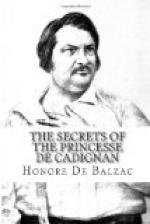The hour had come; Diane was now to entangle that great man in the inextricable meshes of a romance carefully prepared, to which he was fated to listen as the neophyte of early Christian times listened to the epistles of an apostle.
“My friend,” began Diane, “my mother, who still lives at Uxelles, married me in 1814, when I was seventeen years old (you see how old I am now!) to Monsieur de Maufrigneuse, not out of affection for me, but out of regard for him. She discharged her debt to the only man she had ever loved, for the happiness she had once received from him. Oh! you need not be astonished at so horrible a conspiracy; it frequently takes place. Many women are more lovers than mothers, though the majority are more mothers than wives. The two sentiments, love and motherhood, developed as they are by our manners and customs, often struggle together in the hearts of women; one or other must succumb when they are not of equal strength; when they are, they produce some exceptional women, the glory of our sex. A man of your genius must surely comprehend many things that bewilder fools but are none the less true; indeed I may go further and call them justifiable through difference of characters, temperaments, attachments, situations. I, for example, at this moment, after twenty years of misfortunes, of deceptions, of calumnies endured, and weary days and hollow pleasures, is it not natural that I should incline to fall at the feet of a man who would love me sincerely and forever? And yet, the world would condemn me. But twenty years of suffering might well excuse a few brief years which may still remain to me of youth given to a sacred and real love. This will not happen. I am not so rash as to sacrifice my hopes of heaven. I have borne the burden and heat of the day, I shall finish my course and win my recompense.”
“Angel!” thought d’Arthez.
“After all, I have never blamed my mother; she knew little of me. Mothers who lead a life like that of the Duchesse d’Uxelles keep their children at a distance. I saw and knew nothing of the world until my marriage. You can judge of my innocence! I knew nothing; I was incapable of understanding the causes of my marriage. I had a fine fortune; sixty thousand francs a year in forests, which the Revolution overlooked (or had not been able to sell) in the Nivernais, with the noble chateau of d’Anzy. Monsieur de Maufrigneuse was steeped in debt. Later I learned what it was to have debts, but then I was too utterly ignorant of life to suspect my position; the money saved out of my fortune went to pacify my husband’s creditors. Monsieur de Maufrigneuse was forty-eight years of age when I married him; but those years were like military campaigns, they ought to count for twice what they were. Ah! what a life I led for ten years! If any one had known the suffering of this poor, calumniated little woman! To be watched by a mother jealous of her daughter! Heavens! You who make dramas, you will never




